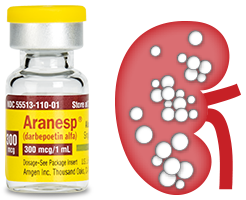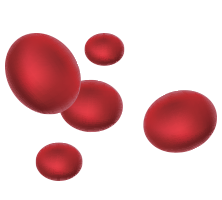
Aranesp® is a man-made form of erythropoietin, a human protein naturally produced by the kidney.1
Aranesp® is a prescription medicine used to treat a lower than normal number of red blood cells (anemia) caused by chronic kidney disease in patients on dialysis and not on dialysis.
Aranesp® is a prescription medicine used to treat a lower than normal number of red blood cells (anemia) caused by chemotherapy that will be used for at least two months after starting Aranesp®.
Aranesp® has not been proven to improve quality of life, fatigue, or well-being.
Aranesp® should not be used for the treatment of anemia:

Aranesp® is a man-made form of erythropoietin, a human protein naturally produced by the kidney.1

Aranesp® "tells" the cells in your bone marrow to grow into new red blood cells within your bloodstream.1

More blood cells mean a higher hemoglobin level, so that your blood can carry more oxygen to your organs and muscles.7
In a clinical study of patients with lung cancer, Aranesp® was shown to reduce the need for red blood cell transfusion by 48%.8
Aranesp® is used to treat a lower than normal number of red blood cells (anemia) caused by chemotherapy that will be used for at least two months after starting Aranesp®.
Aranesp® has not been proven to improve quality of life, fatigue, or well-being, and should not be used if:
If chemotherapy has caused you to develop anemia that cannot be managed with RBC transfusion, your healthcare provider may want to address your anemia in another way. Aranesp® can help.
Aranesp® is an erythropoiesis-stimulating agent, or ESA. An ESA is a man-made protein that helps activate the production of new red blood cells. More red blood cells means a higher hemoglobin level, so your blood can carry more oxygen to your organs and tissues.
By injection under the skin, either once a week or once every three weeks as prescribed by your healthcare provider.

Do not take Aranesp® if you:
Aranesp® may not be right for you. Tell your healthcare provider about all your health conditions, including if you:
Tell your healthcare provider about all the medicines you take, including prescription and nonprescription medicines, vitamins, and herbal supplements.
Know the medicines you take. Keep a list of your medicines with you and show it to your healthcare provider when you get a new medicine.
Aranesp® is indicated for the treatment of anemia in patients with non-myeloid malignancies where anemia is due to the effect of concomitant myelosuppressive chemotherapy, and upon initiation, there is a minimum of two additional months of planned chemotherapy.
Aranesp® has not been shown to improve quality of life, fatigue, or patient well-being.
Aranesp® is not indicated for use:
Please see Aranesp® full Prescribing Information, including Boxed WARNINGS, and Medication Guide.
See More +
Aranesp® is indicated for the treatment of anemia in patients with non-myeloid malignancies where anemia is due to the effect of concomitant myelosuppressive chemotherapy, and upon initiation, there is a minimum of two additional months of planned chemotherapy.
Aranesp® has not been shown to improve quality of life, fatigue, or patient well-being.
Aranesp® is not indicated for use:
Please see Aranesp® full Prescribing Information, including Boxed WARNINGS, and Medication Guide.